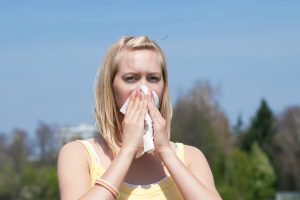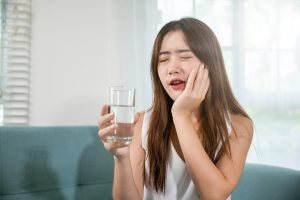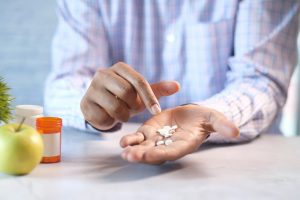Nitrofurantoin is an often recommended antibiotic when it comes to treating urinary tract infections (UTIs). Many people are curious about how well this drug works with routines like drinking coffee. Although coffee can be consumed with most antibiotics, some questions exist regarding how coffee interacts with Nitrofurantoin. This article explores this subject and answers questions like ‘Can you drink coffee while taking Nitrofurantoin?’ Read on to learn more about drinking coffee while receiving Nitrofurantoin treatment for a UTI.
What Is Nitrofurantoin?
Nitrofurantoin is an antibacterial antibiotic used to treat urinary and bladder infections, though not all. This medication is taken orally, either as a tablet or a capsule. Nitrofurantoin comes in various brand names.
How Does Nitrofurantoin Work?
Once ingested, Nitrofurantoin is filtered out of the blood into the urine and delivered to the bacteria’s site. When it comes into contact with the bacteria, it penetrates the bacterium’s cells and obliterates their genetic material, slowing down the growth of the germs in the urinary system.
Since Nitrofurantoin has limited bloodstream absorption and concentration, it is mainly used to treat UTIs. It works well for susceptible bacteria-related UTIs.
What Is the Best Time to Take Nitrofurantoin?
Nitrofurantoin should be taken twice or four times daily. The proper regimen will be dependent on your health and doctor’s recommendation. Make sure to carefully follow the guidelines on the medication and those from your doctor.
When you take the medication twice daily, distribute your dosages equally throughout the day, giving yourself a 12-hour break between doses. For instance, if you take the first dose at 7:30 a.m., the second dosage should be taken at 7.30 p.m.
In severe cases that require taking the capsule or tablets four times a day, consider taking the first dose early in the morning. Follow it up with a second dose at midnight, late afternoon, and finally at night. If you forget to take an amount, do not compensate for the missed dose by taking two doses simultaneously. Instead, skip it and continue with your next dose.
Side Effects of Nitrofurantoin
Nitrofurantoin has more than a few side effects with varying levels of severity. Some of these side effects do even necessitate medical intervention and may go away as your body becomes accustomed to the new medication.
Common Side Effects
Most people notice these common side effects when taking Nitrofurantoin. However, they may disappear without medical intervention.
- Fever
- Cough
- Chills
- Shortness of breath
- Skin rash
- Troubled breathing
Less Common Side Effects
- Dizziness
- Headache
- Blood in urine or stools.
- Unusual tiredness/weakness
- Sore throat
- Burning, numbness, tingling or painful sensations
- Rare and Severe Side Effects
- Stomach or abdominal pains
- Blindness
- Confusion
- Cracks in the skin
- Darkening of the urine
- Decreased vision
- Nausea or vomiting
While this list contains most of the side effects of Nitrofurantoin, some people may notice other side effects. If you notice any side effects from taking Nitrofurantoin, inform your doctor immediately.
Loss of Appetite
If you experience fullness or loss of appetite, try to eat when you are usually hungry. Eating small chunks of food more often is also a great idea as it prevents stomach gases that result from increased acid in the stomach that is usually released to digest food whenever you consume large meals.
Include high-calorie foods in your diet. Nitrofurantoin may affect your appetite, so eating foods high in calories helps provide your body the energy it needs to function while you take the drug. This balanced approach guarantees you maintain your nutritional intake and general well-being throughout the treatment.
Headache
Like many drugs, Nitrofurantoin can trigger headaches in specific individuals as a side effect. Though the precise process by which it causes headaches is unclear, it is thought to be connected to how it affects particular neurotransmitters or blood vessels in the brain.
Staying hydrated can help with these headaches. Furthermore, you can use painkillers like paracetamol or ibuprofen. See your physician as soon as you can if the headache continues and gets worse.’
Read also: What Can Nitrofurantoin Be Used to Treat?
Foods to Avoid When Taking Nitrofurantoin
You can stick to your usual diet if your doctor prescribes Nitrofurantoin. However, be aware that certain foods may aggravate your infection symptoms. These foods are outlined below:
Sugary Drinks
Sugary foods do not interact with Nitrofurantoin directly. However, these foods may create a conducive environment for the growth of bacteria in the urinary system. These may include:
- Energy drinks
- Sports drinks
- Granola
- Flavored non-dairy milk
- Flavored yogurt
- Soda
- Sweetened teas and coffee
Spicy food
Spicy foods may irritate the urinary system and exacerbate symptoms of a UTI, such as burning or discomfort when urinating. Therefore, avoiding hot meals when taking Nitrofurantoin reduces pain and encourages a more comfortable healing process. Some spicy foods to avoid include:
- Peppers
- Garlic
- Curry
Acidic Foods/Fruits
Eating acidic foods may worsen symptoms of UTIs, such as burning pain or difficulty urinating. These may include:
- Lemons
- Limes
- Oranges
- Grapefruits
- Berries
- Pineapples
High Sugar Foods
Foods high in sugar have the potential to create an environment in the urinary system that is favorable to bacterial development. Limiting sugary meals is advised to prevent infection symptoms from worsening, as Nitrofurantoin is frequently used for UTIs. Some of these foods include:
- Honey or Table sugar
- Desserts like cookies, cake, and ice cream
- Salad dressings and condiments like ketchup
- Sweetened cereals
- Ice Cream
Avoid Alcohol
Drinking alcohol might aggravate bladder irritation and exacerbate infection symptoms. Furthermore, drinking may worsen some of the adverse effects of Nitrofurantoin, like nausea and vertigo. Therefore, to prevent pain and potential bad reactions, it is advised to decrease or eliminate alcohol while taking Nitrofurantoin.

Can You Drink Coffee While Taking Nitrofurantoin Medication?
Moderate amounts of coffee do not significantly impede the effectiveness of Nitrofurantoin. However, taking large amounts of coffee might have side effects and interactions like worsening infection symptoms as a result of the dehydration that accompanies caffeine consumption.
While there are no interactions between coffee (caffeine) and Nitrofurantoin, coffee indirectly affects how the drug works in your body. One of these effects is dehydration. Drink enough water to stay well hydrated.
Can I Drink Decaf Coffee While Taking Nitrofurantoin?
So, can you drink coffee while taking Nitrofurantoin? Decaffeinated coffee has no negative consequences from excessive caffeine consumption. However, avoiding excessive table sugar use is recommended since it might create a conducive environment for bacteria growth in your urinary tract. Decaffeinated coffee has less caffeine and no diuretic qualities. This is gentler for UTI patients.
Can I Consume Other Caffeinated Beverages While Taking Nitrofurantoin?
Moderate consumption of caffeinated beverages is, on average, safe as there are no significant interactions with Nitrofurantoin. Therefore, you should keep your body hydrated by taking plenty of fluids like water. This helps diminish side effects linked to dehydration, like headaches and nausea.
Can Consuming Coffee Affect the Effectiveness of Nitrofurantoin?
The caffeine in coffee does not affect Nitrofurantoin efficacy directly. However, excess caffeine may irritate the bladder, hence worsening the symptoms of the infection. This impedes the effectiveness of the drug because the symptoms become chronic.
Can Consuming Coffee Increase the Risk of Side Effects from Nitrofurantoin?
Nitrofurantoin and coffee might cause nausea and stomach pain. Heavy coffee consumption, especially on an empty stomach, worsens these effects. Excess coffee consumption may cause dehydration, exacerbating nitrofurantoin side effects like headaches.
How Long Should I Wait After Drinking Coffee to Take Nitrofurantoin?
It may depend on whether you take two or four doses daily. Observe the gaps between the doses and use those to take your coffee. Consume it moderately to ensure the effectiveness of the drug is not degraded. When taken instead, coffee has no significant effects on your healing journey.
Can I Consume Coffee and Nitrofurantoin if I Have a History of Kidney Problems?
As a diuretic, caffeine increases urine production and frequency. It also elevates blood pressure and dehydrates, which is bad for kidney patients. Kidney problems do not respond to Nitrofurantoin. Kidney problems require professional medical advice.
Is It Safe to Consume Coffee and Nitrofurantoin if I Am Pregnant or Breastfeeding?
Nitrofurantoin is safe only during early pregnancy. Animal research suggests the medication is safe for early-pregnant babies. Late pregnancy is known to increase the risk of neonatal jaundice. This drug should not be taken in the last 2–4 weeks of pregnancy. Similarly, breastfeeding mothers should avoid Nitrofurantoin. The medicine may harm a newborn if it passes through breast milk.
Can Consuming Coffee Affect the Excretion of Nitrofurantoin From the Body?
Caffeine in coffee increases urine production, which often leads to frequent urination. Since Nitrofurantoin is filtered into the urine to the bacteria site, passing urine more frequently can lead to premature clearance of the medication from the body, especially if the coffee is consumed in large amounts.
Can I Consume Coffee and Nitrofurantoin if I Am Allergic to Caffeine?
If you’re allergic to caffeine, you should avoid foods or caffeinated beverages while taking Nitrofurantoin, as they may trigger an allergy reaction. Swelling, itching, and difficulty breathing are all less common side effects of Nitrofurantoin, but they can be made worse by similar allergic responses often associated with caffeine allergies.
Can Consuming Coffee and Nitrofurantoin Together Lead to Drug Interactions With Other Medications?
Nitrofurantoin does not interact with food, meaning taking coffee with Nitrofurantoin is less likely to lead to interactions with other medications. However, consult with your doctor for more detailed advice. Excessive consumption of coffee may make some of Nitrofurantoin’s adverse effects worse.
Antacids that include magnesium trisilicate should be avoided when taking Nitrofurantoin. Magnesium trisilicate and Nitrofurantoin can bind when taken together, hindering the drug’s absorption by the body. This reduces the effectiveness of the drug and may make the UTI worse by making urinating more frequent. To guarantee that the recommended course of treatment for your UTI is convenient, you must avoid mixing these substances.
Can Consuming Coffee and Nitrofurantoin Lead to Liver Damage?
There isn’t any concrete proof that drinking coffee and taking Nitrofurantoin together damages the liver. However, because the liver processes coffee and Nitrofurantoin, consuming too much of either over time may eventually cause liver strain.
Can Consuming Coffee and Nitrofurantoin Lead to Increased Blood Pressure?
Caffeine itself does increase blood pressure even when consumed independently of Nitrofurantoin. Therefore, its combined use with Nitrofurantoin might raise blood pressure, especially if the coffee is consumed in large amounts.
The stimulating nature of coffee does speed up the heart, thus causing an increase in blood pressure. So, drink moderate amounts of coffee and stay hydrated while taking Nitrofurantoin.
Can I Consume Coffee and Nitrofurantoin if I Am Taking Other Antibiotics?
Caffeine can increase stomach acid production. This is not good because it will worsen some antibiotics’ side effects, such as gastrointestinal problems and stomach discomfort. Coffee consumed in large amounts leads to dehydration, which, when combined with the horrendous effects of some antibiotics, can make things get out of hand.
Can Consuming Coffee and Nitrofurantoin Lead to Gastrointestinal Problems?
Yes. Gastrointestinal problems like vomiting, nausea, and abdominal pain are known side effects of Nitrofurantoin. Taking excess coffee will exacerbate these side effects.
Can Consuming Coffee and Nitrofurantoin Lead to Decreased Appetite?
It is true that Nitrofurantoin’s gastrointestinal adverse effects, combined with the dehydration brought on by consuming too much coffee, can cause appetite loss. Taking excess coffee could make this worse. However, this can differ from person to person in various situations; if you consistently struggle with eating, you should see a doctor.
When Is Coffee Safe to Drink Again?
Coffee safety varies from person to person and is influenced by personal tolerance and medical conditions. It is usually okay to reinstate coffee into your diet once your treatment has ended and your UTI has cleared up if you are worried about possible interactions between coffee and Nitrofurantoin.
Read also: How Safe Is Nitrofurantoin in Pregnancy?
Frequently Asked Questions
If you take Nitrofurantoin in moderation, you can safely consume coffee. On the other hand, drinking too much caffeine may make some UTI symptoms worse. For specific advice, it’s best to speak with your healthcare professional.
Yes, adverse effects are possible with Nitrofurantoin. Headaches, nausea, and vomiting are typical ones. See your healthcare practitioner if you encounter severe or enduring adverse effects.
Nitrofurantoin, marketed under the Macrobid brand, cures kidney infections by preventing bacterial development in the urinary tract and subsequently curing the illness.
Yes, it is crucial to maintain adequate hydration when using Nitrofurantoin. Enough water supports the medication’s efficacy by removing bacteria from the urinary tract.
Avoiding excessive amounts of caffeine, alcohol, and acidic or spicy meals is advised when taking Nitrofurantoin, as these may aggravate the symptoms of a urinary tract infection.





